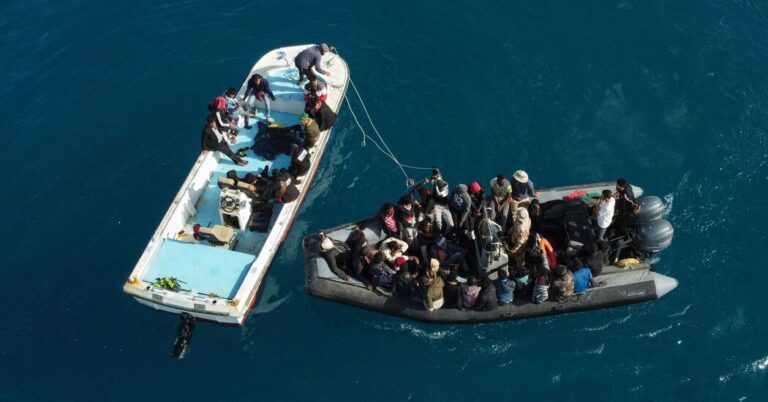At least fifty-five people drowned after their boat sank off the coast of Libya, the United Nations migration agency said on Wednesday, the latest in a series of deadly accidents in just a few days involving migrants trying to cross the Mediterranean to Europe.
The rubber boat, carrying 60 people, left Tuesday morning from Garabouli, a small town a few dozen miles east of Tripoli, Libya’s capital, according to the agency, the International Organization for Migration. Only five survivors were brought to shore by the Libyan coast guard.
“This is a very high number of lives,” said Safa Msehli, a spokeswoman for the organization. “And these deaths have become normalized, as a matter of fact,” she added. “That is a very, very dangerous thing.”
Human rights organizations have for years protested the lack of preventive search and rescue patrols by countries around the Mediterranean.
The latest disaster happened shortly after the bodies of dozens migrants, killed as their boats sank or capsized last week, washed ashore on the beaches of Sabratha, west of Tripoli. And on Monday, 33 people died in four different accidents near the Italian island of Lampedusa, according to Flavio di Giacomo, a spokesman for the U.N. agency.
In total, 661 people have died in the central Mediterranean this year, he said. The number of deaths at sea includes people who went “missing” but after some hours are considered dead.
After the dictator Muammar el-Qaddafi was toppled and killed in 2011, Libya descended into civil war and its territory remains divided among warring factions. Amid the chaos of recent years, it has become a major transit point to Europe for tens of thousands of African migrants. With few pathways for legal migration available, many pay smugglers to help them make the dangerous sea crossing.
Ms. Msehli called the situation in Libya “extremely concerning,” with migrants within the country who are subject to kidnapping, abuse, arbitrary detention and exploitation by criminal groups and trafficking networks. Then some depart on overcrowded rubber dinghies handled by smugglers, making the central Mediterranean the deadliest maritime route in the world, according to the agency.
“That only signals the despair that people are facing possibly back home and the conditions that they’re facing in Libya,” she said.



